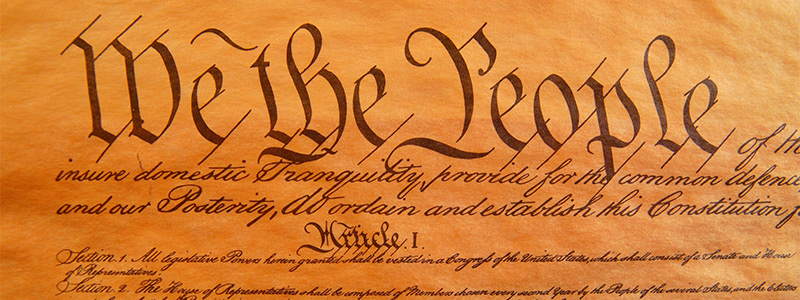What is Originalism?

Is the Constitution a living document, one that should change and evolve over time, or is it a text frozen in the moment of its creation, strictly bound by the Founding Fathers’ original intentions?
David A. Strauss, Gerald Ratner Distinguished Service Professor of Law at the University of Chicago, wrote The Living Constitution (Oxford University Press, 2010) to address this question.
Strauss has served as Special Counsel to the U. S. Senate Judiciary Committee and as Assistant Solicitor General of the United States, and argued nineteen cases before the U.S. Supreme Court. Court’s Resident Dramaturg about Justice Scalia and the debate over the nature of the Constitution.
What is your definition of originalism?
I think originalism is the claim that we can figure out what the Constitution allows and forbids by looking at decisions made by the Founders—decisions made at the time the Constitution was written. My view is that just cannot be done. You cannot get answers to today’s issues by consulting the intentions of people who lived in an utterly different country in the late 18th century. And because originalism really doesn’t work in the way its proponents claim, the appeal to the Founders ends up being a kind of rhetorical move that people use to accomplish something else. Originalists, I think, often find principles in the text and in the decisions of the founding generation that they want to find there. They might be perfectly good principles, but they should be defended on their own merits, not by invoking the authority of the Founders or the text.
What kind of originalist was Antonin Scalia?
Justice Scalia was regarded as a conservative, but one thing people do not always realize is that originalism is not necessarily a conservative approach. The most influential originalist of the last 100 years was not Justice Scalia at all. It was Justice Hugo Black, an intellectual force for civil rights and free speech on the Warren Court. In most respects, Justice Black was what we would call a liberal, and he very much fancied himself an originalist.
What that tells me is that originalism is something people use to attack the tradition they grew up in. Justice Black, who was from Alabama, grew up in a tradition of racism, in a time when there was Jim Crow segregation and repression in the South, and he hated it. So he appealed to the Founders, claiming that they believed in racial equality and civil liberties. Racial equality and civil liberties are good things, but it’s not so clear that the Founders thought so!
Justice Scalia grew up in the Warren Court era, when the Court was aggressively protecting what the Court saw as disadvantaged groups in society, and Justice Scalia thought the Warren Court went too far. So he portrayed the Founders in a different way.
Your view of the Constitution is the opposite of originalism. Could you explain what you mean by a “living” Constitution?
One of the strengths of our Constitutional system is that it maintains certain principles as fundamental, but it shapes and adapts those principles to changing circumstances, changing times, and to particular crises that arise. That’s because our system, it seems to me, is based mostly on precedent and tradition, instead of simply looking for an authoritative command from the Founders or the text of the Constitution. That’s the sense in which the Constitution is “living”: it is able to adapt without losing touch with the past, by continuing to develop principles that have been worked out over time.
What are examples of the “living Constitution” in action?
There are a lot of them, because major events in the history of this country have changed our understanding of the Constitution in many ways. Those changes are now built into our institutions and our traditions and even our ways of thinking about each other. Take racial equality, for example. The Supreme Court’s decisions establishing principles of racial equality rely on the Fourteenth Amendment to the Constitution, but when that Amendment was adopted, the idea that African Americans were equal to whites was a radical position. The Amendment just gave blacks certain limited rights. No one, for example, thought that the Amendment meant that there was a right to interracial marriage. But over time, we made progress. Americans came to understand that racial discrimination was intolerable in all its forms. It took a while for the country to come around to that view, but the country did come around, and it is now a point of essentially universal consensus—as much a part of the Constitution as anything you can think of, even though the text was never amended. I could give you a lot of other examples; women’s equality is in a way an even more dramatic case. ■
Check out The Originalist at Court Theatre, May 10 – June 10, 2028.